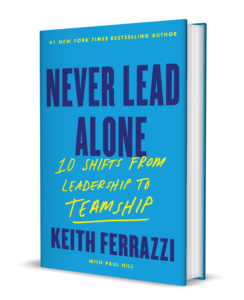During a recent call with a group of presidents from some of the world’s largest companies, the number-one issue keeping them awake at night was attracting and retaining great talent. It’s an issue that companies of every size have been grappling with since the Covid-19 pandemic disrupted first our lives and then the labor market. The executives were participating in a discussion of the Great Resignation, hosted by the Growth Institute, which is our research arm. The president of a large consumer products division expressed a familiar concern, that the new remote work environment had weakened connections among co-workers and thus removed some of the friction from job-switching.
I understood the concern, but I had a different perspective. Although strong relationships among team members are vital to engagement and retention, the assumption that those relationships depend on being co-located is a myth that needs serious busting. In Competing in the New World of Work, I point out that if your team members miss the camaraderie of water cooler chats, then the challenge of increasing team cohesion must be undertaken on a consistent and deliberate basis. Our research has identified a series of high-return practices for re-creating and deepening the ties of co-workers–no matter where they are located.
Use peer-to-peer career and onboarding support.
Ferrazzi Greenlight’s work with Siemens and other companies has shown that effective onboarding of new employees during their first 30 days can cut turnover rates by 30 percent over the following two years. Onboarding should be designed to encourage a culture of peer-to-peer support. Set up processes for assigning “onboarding pods” around new hires, and install a system for the pods to curate deep dives into company culture, practices, and products.
Devote meeting time to collaboration.
One way to inject learning into everyday work is to use your regular staff meeting to inspire team members to think creatively about how to solve pressing organizational challenges. Move beyond the usual check-in format for meetings and put a question on the table for everyone to dig into. People grow closer when they create together.
Encourage coaching to accelerate outcomes.
Give your team members guidance on how to become active coaches for their peers. When a group of Merrill Lynch’s top advisers began a popular peer-to-peer adviser growth network to offer coaching in high-growth best practices, Merrill subsequently reported a sixfold increase in the rate of household acquisitions and hit all-time records in revenue and net income.
Emphasize emotional commitment and support.
Workhuman’s 2021 survey on the Great Resignation found that employees who got weekly check-ins from team leaders were more than twice as likely to feel trust, belonging, purpose, and connection in their work than those who didn’t. Set an example by doing a quick weekly personal and professional check-in with each team member, and make time for occasional bonding dinners.
Celebrate peer-to-peer activity as contributions to the team.
End each meeting with a “gratitude circle,” in which everyone briefly says what they are grateful for, or to celebrate someone from the week. The Workhuman survey found that givers and receivers of gratitude are far more likely to agree that leadership appreciates them and, similarly, to feel meaning, purpose, and happiness at work.
The leaders of our roundtable understand that the conditions of the Great Resignation may hang around, but if they focus on leveraging their own people to support, grow, and develop their peers, they’ll make their own organizations stickier.






